Subtotal $0.00
The state of Oregon finds itself at the center of a contentious debate over the implementation of zero-emission vehicle (ZEV) regulations for medium- and heavy-duty trucks. House Bill 3119, currently under discussion in the Oregon Legislature, seeks to delay the state’s Advanced Clean Trucks (ACT) rule by two years, citing concerns over infrastructure readiness, economic feasibility, and technological limitations.
Oregon’s ACT rule, which took effect on January 1, 2024, does not prohibit the sale of diesel trucks but mandates that an increasing percentage of new truck sales be zero-emission vehicles over a phased timeline. The intent is to accelerate the transition toward cleaner transportation and reduce greenhouse gas emissions. However, the implementation of the rule has led to some unintended consequences, including Daimler Truck North America briefly pausing combustion engine sales in the state due to regulatory uncertainty.
The Case for a Delay
Proponents of House Bill 3119 argue that Oregon lacks the necessary charging infrastructure to support widespread adoption of ZEV trucks. Representative Shelly Boshart Davis (R, Albany) emphasized the economic burden such regulations impose, arguing that Class 8 electric trucks cost twice as much as their diesel counterparts, carry less freight, and have significantly reduced travel ranges. Given the nascent state of zero-emission trucking technology, she and other supporters contend that mandating these vehicles before the market is fully developed could disrupt supply chains and increase costs across multiple industries.
Business owners and industry groups have also voiced concerns about compliance, highlighting that the mandates may force the sale of trucks that are either unavailable in sufficient quantities or unsuitable for current logistics operations. According to the Oregon Legislative Information System, written testimony in favor of the bill outnumbered opposition nearly 4-to-1, demonstrating a strong pushback from the trucking industry and related stakeholders.
The Case Against a Delay
On the other side of the debate, environmental advocates and policy experts caution that postponing the ACT rule could slow progress toward Oregon’s climate goals. Transportation is one of the largest sources of greenhouse gas emissions in the state, and supporters of the mandate argue that delaying adoption of ZEV trucks prolongs the reliance on fossil fuels, exacerbating climate change and air pollution concerns.
Additionally, delaying the rule could have long-term economic implications. As federal and state governments continue investing in clean energy infrastructure, early adoption of ZEV technology may position Oregon as a leader in sustainable transportation, attracting investment and innovation in the sector. States that delay implementation could risk falling behind in the competitive race toward a greener economy.
Federal Policy and the Road Ahead
The broader regulatory landscape is also evolving. At the federal level, the Biden administration’s Greenhouse Gas Phase 3 regulations have faced legal challenges, and the recently confirmed Environmental Protection Agency (EPA) administrator under the Trump administration, Lee Zeldin, has signaled an intent to roll back certain emissions standards. Similarly, the newly appointed Secretary of Transportation, Sean Duffy, has moved to reverse federal electric vehicle mandates, raising questions about how national policies will shape the future of ZEV adoption.
Oregon is among 10 states that have chosen to follow California’s ACT standards, but given shifting political and economic realities, the state’s commitment to the policy may face increasing scrutiny. While the long-term trajectory of zero-emission trucking appears inevitable, the pace at which it unfolds will depend on a confluence of market readiness, infrastructure development, and regulatory certainty.
Conclusion
As Oregon lawmakers consider House Bill 3119, they must weigh the trade-offs between immediate economic pressures and long-term environmental and technological advancements. A two-year delay could provide valuable time to enhance charging infrastructure and refine vehicle technology, ensuring a smoother transition for businesses. However, opponents warn that any postponement risks undermining the state’s climate leadership and delaying necessary reductions in transportation-related emissions.
The decision on whether to proceed with or pause the ACT rule will have lasting implications not only for Oregon’s trucking industry but also for the broader movement toward cleaner, more sustainable transportation systems. The outcome of this debate will serve as a key indicator of how states navigate the complex balance between economic viability and environmental responsibility in the era of decarbonization.


